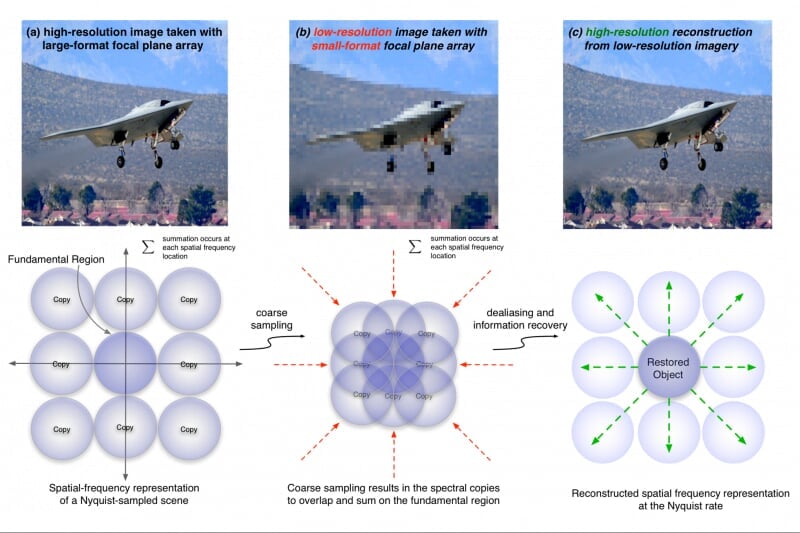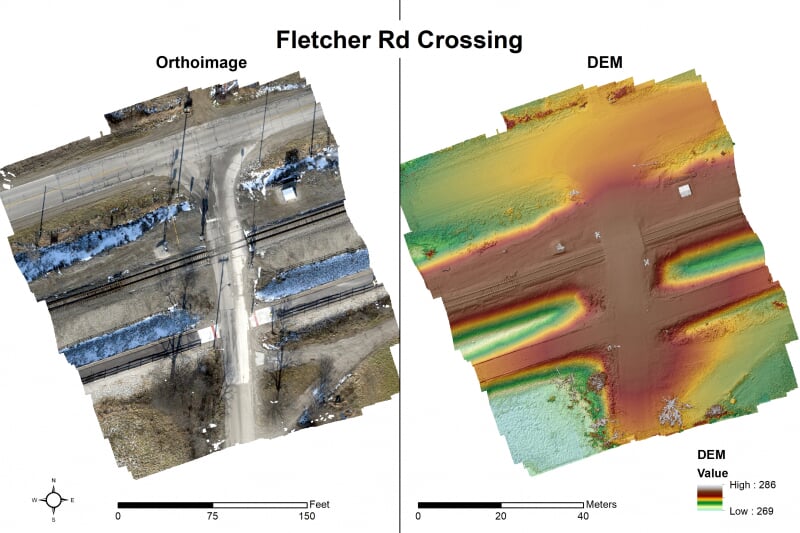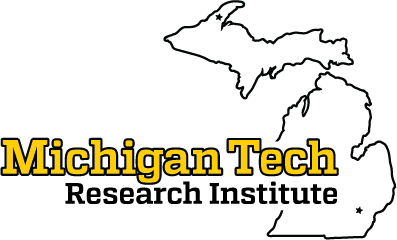MTRI was established in 2006 as a part of Michigan Technological University. MTRI is a recognized leader in the research, development, and practical application of sensors and information technologies to solve critical problems in national security, infrastructure, bioinformatics, earth sciences, and environmental processes. MTRI has a staff of over 100 professionals and conducts approximately $12 million a year in sponsored research activities. MTRI solely relies on external sponsored funding.
Our mission is to provide real-world experience for undergraduate, graduate, Ph.D. students, and recent graduates in a research institute that addresses advanced technology to sense and understand natural and human-made environments.
Preparing Students for the Future
Many Michigan Tech students, along with other university students, have completed summer internships at MTRI. Interns work on real projects with experienced scientists and learn how to use their talents in a team environment.
- Tasks are varied and include field data collection, image processing, programming, data analysis, contributing to reports, and presenting results to colleagues.
- Opportunities to learn more about various scientific and technical disciplines include work with MTRI sponsors such as EPA, GLOS, NIH, USGS, USFWS, NASA, US BLM, USDOT, MDOT, and DoD.
- Compensation for interns is an hourly wage based on schooling and other experience.
Eligibility:
- Be a student in good standing at or recently matriculated from an accredited college or university
- Be majoring or received a degree in a field appropriate to the job opening
- Have a minimum grade point average of 3.0 on a 4.0 scale, or equivalent
- *All applicants must have the ability to obtain a Department of Defense security clearance, which requires that the applicant be a United States citizen.
Michigan Technological University is an Equal Opportunity Educational Institution/Equal Opportunity Employer that provides equal opportunity for all, including protected veterans and individuals with disabilities.
AI & Autonomy Practice Area
The AI & Autonomy Practice Area at MTRI develops advanced autonomous systems capabilities for government and industry partners through sensor phenomenology expertise, theoretically grounded control algorithms, and novel orchestration approaches.
The AI/Autonomy Practice Area internship is focused on providing education, research experiences, and development of technological skills for undergraduate students, graduate students, and recent Ph.D.s through project-driven research. Tasks vary based on currently funded research portfolio and Principal Investigator (PI) needs.

Internships for the AI/Autonomy Practice Area Qualifications and Requirements
- Undergraduate mathematics coursework including at least Calculus, Linear Algebra, and Differential Equations; ideally also including Probability and Statistics as well as Complex Variables
- Preferably computer science coursework particularly in Algorithms and Data Structures
- Programming experience in Python and/or Matlab, and preferably experience in version control (e.g. GIT)
- Excellent oral and written presentation skills, including technical document and briefing preparation skills for publications, reports, and demonstrations
- Currently pursuing or recently received a Bachelor’s, Master’s, or a Ph.D. degree, with preference to those in applied mathematics, statistics, electrical engineering, computer science, or computational physics
- Comfortable working within a Linux and Windows PC environment
Sensing the Natural Environment Practice Area
Our vision is to be a globally recognized leading institute, pioneering innovative solutions to integrative remote sensing, field data analysis, modeling, and GIS technology. Our goals are to improve the mapping and monitoring of natural landscapes, to better understand ecosystem vulnerability to land development and climate change, to assess and predict the impacts of natural disasters, to help inform land managers, and to advance scientific research of the earth and near-earth space environment for a better understanding of our planet and beyond.

Intern candidate for Sensing and Natural Environment desired qualifications and skill sets
- Experience with remote sensing and/or GIS software, such as ESRI ArcGIS, QGIS, ERDAS Imagine, ENVI, eCognition, Google Earth Engine, or OpenSARLabs
- Familiarity with geospatial data/maps
- Experience or desire for conducting field work in various landscapes, such as wetlands, forests, or aquatic environments
- Experience with programming is a plus (such as Python, ArcPy, C++, or MATLAB)
- Familiarity with statistical analysis and statistics software is helpful (such as R, SPSS, JMP)
- Currently pursuing or recently received a Bachelor’s, Master’s, or Ph.D. degree, with preference to those in a field of environmental, earth science, forestry, biology, geospatial data science, or environmental engineering.
Interns will support research projects within the Institute
- Assessment and mapping of wetlands in Michigan
- Forest fire monitoring and mapping with GIS and remote sensing imagery
- Studies related to management of natural resources in the Arctic and boreal, transportation infrastructure condition assessment
- Image data downloads, image processing and analysis, GIS-based analysis, field work, report preparation, web portal support, and other tasks related to research and analysis of remote sensing data
- Field work - can involve frequent travel which is covered 100%
Transportation & Mobility Practice Area
Michigan Tech Research Institute (MTRI) has a reputation as an internationally recognized leader in problem solving for intelligent transportation systems, transportation asset management, and evaluation of transportation systems.
Intern candidate for Transportation and Mobility desired qualifications and skill sets
- Experience with remote sensing and/or GIS software, such as ESRI ArcGIS, QGIS, ENVI, eCognition
- Experience or desire for conducting field work in various landscapes
- Comfortable working within a Windows PC and/or Linux environment
- Experience with programming (such as Python, ArcPy, C++, or MATLAB)
- Familiarity with statistical analysis and statistics software is helpful (such as R, SAS, JMP)
- Experience with CAD software, digital twins, and/or simulation software is a plus
- Current students or recent graduates with a Bachelor's, Master's, or Ph.D. degree. Preference to those with a engineering, mathematics, science, and/or computing background
Sensing the Human Environment Practice Area
Join our Michigan Tech Research Institute team to perform research on areas of top
priority for US national security and industry partners. The Sensing the Human Environment
team is dedicated to providing remote sensing and AI based solutions to sense, identify,
and exploit all domain information gathered from human-made features in the environment.
Potential projects may include simulation and analysis of modern signal processing
algorithms including radar and communication techniques, synthetic aperture radar,
data manipulation and augmentation including generative AI techniques, or work using
modern statistical methods across a range of real-world problems.
Intern candidate for Sensing in the Human Environment desired qualifications and skill sets
- Looking for motivated engineers, mathematicians, and physicists
- Knowledge of signal and image processing
- Radar and synthetic aperture radar experience
- Experience with programming is a plus (Python, C++, MATLAB)
- Current students or recent graduates with a Bachelor's, Master's, or Ph.D. degree. Preference to those with a engineering, mathematics, science, and/or computing background
Water Sciences Practice Area
Our vision is to be a globally recognized leading institute pioneering innovative physics-based remote sensing solutions to monitor water quality throughout the world. Our goals are to improve the mapping and monitoring of water quality parameters to better understand ecosystem vulnerability to climate change and anthropogenic forcing to help inform water quality managers and stakeholders. We aim to leverage a wide range of sensing modalities from satellites, aircraft, drones, and in-water platforms.
Intern candidate for Water Sciences desired qualifications and skills
- Familiarity with remote sensing and/or GIS software, such as ESRI ArcGIS, QGIS, ERDAS Imagine, ENVI, eCognition, Google Earth Engine, or OpenSARLabs
- Familiarity with geospatial data/maps
- Experience or desire for conducting field work in costal and open water areas of the Laurentian Great Lakes
- Experience working on boats and deploying equipment
- Familiarity with statical analysis and statistics software (such as R, SPSS, JMP)
- Experience with programming is a plus (such as Python, ArcPy, MATLAB, or C++)
- Current students or recent graduates with a Bachelor's, Master's, or Ph.D. degree. Preference to those with a environmental, earth science, forestry, biology, or environmental engineering background
Interns will support research projects within the Institute
- Assessment and mapping of Great Lakes water quality parameters using remote sensing tools
- Deployment of optical instruments during field work aboard research vessels
- Data collection, modeling, and mapping of harmful algal blooms
- Assessment and mapping of vegetation and benthic throughout the Great Lakes
- Image data downloads, image processing and analysis, GIS-based analysis, field work, report preparation, web portal support, and other tasks related to research and analysis of remote sensing data
Interns in the Field

North American Boreal Peatlands Assessment
Interns Anne Santa Maria and Erik Boren spent the summer in Alberta, Canada, as field-based interns assisting the Vulnerability of North American Boreal Peatlands to Interactions between Climate, Hydrology, and Wildland Fires project. The project goal is to understand how interactions between climate, hydrology and the fire regime impact ecosystem processes and carbon cycling in boreal peatlands.
Phragmites
Field teams assisted the Radar Detection and Monitoring of Invasive Phragmites in the Coastal Great Lakes project. The team collected data on vegetation type, density, and height, as well as water condition measurements at 286 locations throughout the basin. These field measurements help to provide accurate identification of ecosystem types when classifying the PALSAR imagery.

Great Lakes Water Monitoring
Interns assist MTRI staff by research the Great Lakes in many ways, including mapping Cladophora extent and estimate biomass for the entire US and Canadian nearshore region in the four lower Great Lakes, and developing a satellite algorithm for the retrieval of chlorophyll, Dissolved Organic Carbon, and Suspended Minerals for the Great Lakes. Interns also helped support ecosystem restoration and protection efforts in five pilot tributaries in the Great Lakes.

Remote Sensing Bridge Conditions
Student interns assisted researchers from the University and Institute to use remote sensing technologies to monitor the condition of bridges to help improve inspection and repair efficiency. They used thermal infrared and 3D optics systems to scan bridges to help determine the condition based on possible delaminations, spalling, and other distresses, both visible and not visible at the surface.
Mapping Unpaved Roads Locations and Condition
The Michigan Tech team (MTRI and Michigan Tech Transportation Institute) are working with US DOT/RITA to design and develop a remote sensing system to extend the available commercial remote sensing and spatial information tools to enhance an unpaved road assessment system. Interns assist with evaluating both manned and unmanned aerial systems.
USFWS Midwest Wetlands Assessment
Interns helped MTRI researchers perform an accuracy assessment on a classification of wetlands in Iowa. The classification is an update to the National Wetlands Inventory (NWI) performed by St Mary's University of Minnesota. MTRI was also tasked with developing improved accuracy assessment methods and classification methodology.

Increased Fire in Tundra Regions of North America
Interns assisted in a project that used remote sensing and GIS to monitor changes in climate change and increased impacts to tundra including:
- Mapping historic tundra fires across the Arctic
- Searching for evidence of fires in Canadian tundra in summer 2010
- Monitoring tundra fires across the arctic region in 2011
- Assisting with preparation and logistics for field trip to assess effects of 2010 fire in Noatak National Preserve, Alaska
